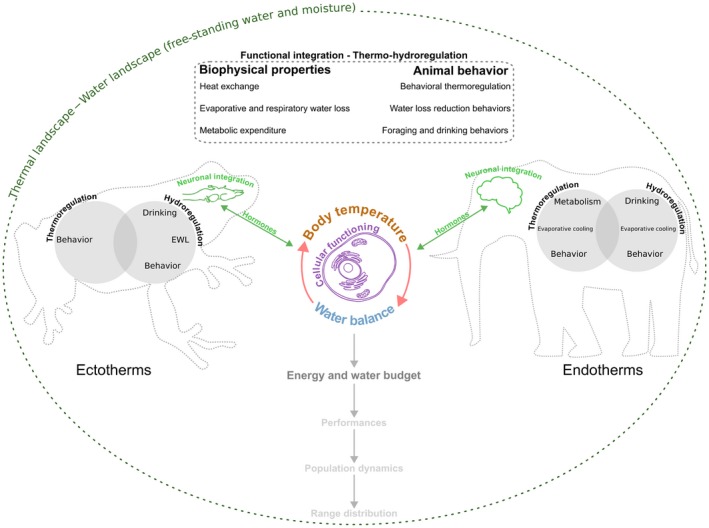Figure 1.

Heat and water exchange rules in ectotherms and endotherms. Body temperature and water balance are jointly influenced by heat and water exchanges within the organism and between the organism and its environment. These exchanges are modulated by (i) the biophysical and physiological properties of the organism and by (ii) behavioral strategies. Biophysical properties include morphology, surface properties (skin ultrastructure, fur, feathers, etc.), and metabolic modes. For instance, skin color, thickness, and ultrastructure in reptiles and amphibians determine heating capacity and resistance to water loss. Heat and water exchanges can influence each other; for example, evaporative water loss (EWL) induces heat loss (evaporative cooling) whereas metabolic reactions are a source of heat and water, for example, through fat catabolism. Behavioral components of thermo‐hydroregulation include activity, microhabitat selection, postural adjustments, and drinking and foraging behaviors. Overall, thermo‐hydroregulation strategies differ between ectotherms and endotherms. Ectotherms rely predominantly on behavioral thermoregulation and secondarily on evaporative cooling, most often in wet‐skinned amphibians and during high flight activity in insects, to regulate their body temperature (Stevenson, 1985). Endotherms generate heat and water through metabolism and use evaporative water losses (panting and/or sweating) to cool down their body. The regulation of body temperature and water balance involves neuronal integration and feedback reactions from the central nervous system that orchestrate hormone secretions involved in the maintenance of temperature and water balance homeostasis. Body temperature and water balance regulation determine on the long run the energy and water budget of the individual and ultimately whole‐organism performances (e.g., locomotion, growth, and reproduction), population dynamics, and eventually range distributions
